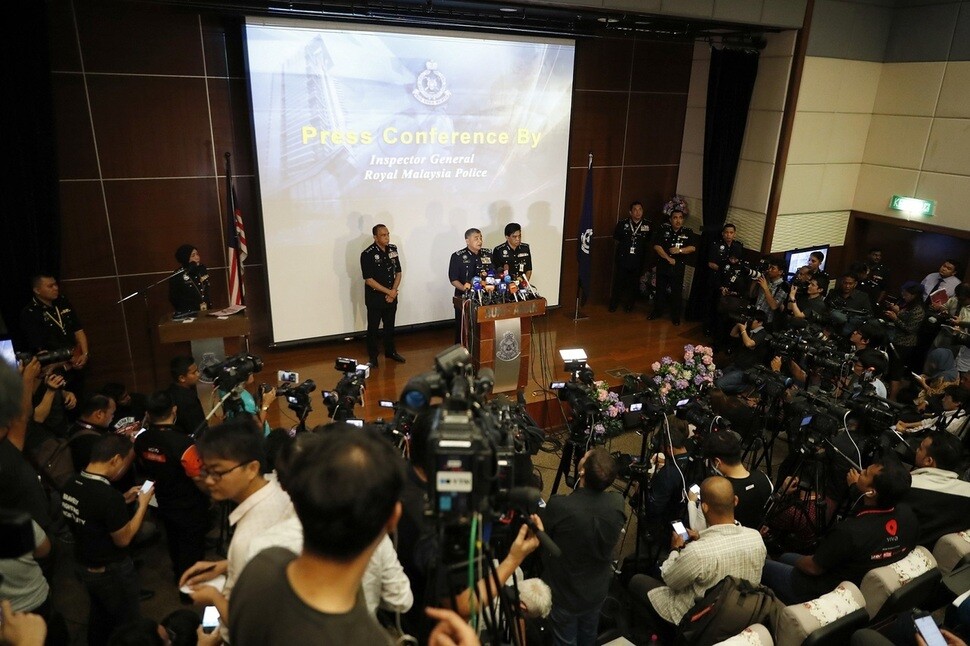hankyoreh
Links to other country sites 다른 나라 사이트 링크
China cautious in mulling response to Kim Jong-nam’s killing

The announcement on Feb. 22 by Malaysian investigators that a diplomat in the North Korean embassy was implicated in the killing of Kim Jong-nam has prompted some to suspect that China, which had been extremely reticent about North Korea’s involvement in the killing, might change its stance.
But even after the announcement by the Malaysian police, China has remained cautious.
When a reporter from Yonhap News asked Chinese Foreign Ministry Spokesperson Geng Shuang about the issue following the regular press briefing on Feb. 22, Geng said that China has already expressed its position on several occasions, that position has not changed and it’s following developments closely. This simply reiterated China’s position from the previous day when it said that it had “noted relevant reports.” Since the first report appeared in the press on Feb. 14, China has consistently responded in the same way. This appears to represent China’s attempt to denying any connection with the incident while avoiding any unnecessary provocations of the North, which has been responding sensitively.
Considering that North Korea‘s responsibility for the killing has not yet been officially confirmed (though Malaysia’s announcement increases the circumstantial likelihood that the crime was orchestrated by the North Korean government), it doesn’t seem likely that China will suddenly begin to denounce North Korea’s involvement and put pressure on Pyongyang. “We hope that relevant parties can properly resolve the issue through dialogue and consultation,” Geng said on Feb. 21.
But China is unable to defend North Korea in regard to the killing of Kim Jong-nam. Even the Chinese media have focused on the possibility that Pyongyang was responsible for the murder, quoting the South Korean media in its extensive coverage of the idea that Kim Jong-nam had been considered as the head of a North Korean government in exile. It’s very likely that the killing of Kim Jong-nam has considerably increased China’s displeasure with Pyongyang, since it’s the latest in a series of incidents that have irritated China, including test launches of missiles. Most importantly, the growing hatred of North Korea in Chinese society could put internal pressure on the Chinese government.
Furthermore, if Kim Jong-nam’s family attempts to bring his body to Macao or some other Chinese territory, the Chinese authorities will have to get involved. Particularly if the family plans not to have the body cremated in Malaysia and the ashes brought back but rather to bring the body into Chinese territory to hold a funeral and bury it there, this will involve a complicated process requiring the approval of the Chinese government. This could spark a dispute with North Korea, which wants the body to be repatriated. As a result, Kim Jong-nam‘s son Kim Han-sol and other family members could engage in preliminary discussions with the Chinese government about transporting the body and holding a funeral before they attempt to visit Malaysia. The implication is that if Kim Han-sol decides to travel to Malaysia, this could be seen not as his own personal decision but rather a decision that has been approved by the Chinese government.
By Kim Oi-hyun, Beijing correspondent
Please direct questions or comments to [english@hani.co.kr]

Editorial・opinion
![[Column] Season 2 of special prosecutor probe may be coming to Korea soon [Column] Season 2 of special prosecutor probe may be coming to Korea soon](https://flexible.img.hani.co.kr/flexible/normal/500/300/imgdb/original/2024/0426/3317141030699447.jpg) [Column] Season 2 of special prosecutor probe may be coming to Korea soon
[Column] Season 2 of special prosecutor probe may be coming to Korea soon![[Column] Park Geun-hye déjà vu in Yoon Suk-yeol [Column] Park Geun-hye déjà vu in Yoon Suk-yeol](https://flexible.img.hani.co.kr/flexible/normal/500/300/imgdb/original/2024/0424/651713945113788.jpg) [Column] Park Geun-hye déjà vu in Yoon Suk-yeol
[Column] Park Geun-hye déjà vu in Yoon Suk-yeol- [Editorial] New weight of N. Korea’s nuclear threats makes dialogue all the more urgent
- [Guest essay] The real reason Korea’s new right wants to dub Rhee a founding father
- [Column] ‘Choson’: Is it time we start referring to N. Korea in its own terms?
- [Editorial] Japan’s rewriting of history with Korea has gone too far
- [Column] The president’s questionable capacity for dialogue
- [Column] Are chaebol firms just pizza pies for families to divvy up as they please?
- [Column] Has Korea, too, crossed the Rubicon on China?
- [Correspondent’s column] In Japan’s alliance with US, echoes of its past alliances with UK
Most viewed articles
- 1‘We must say no’: Seoul defense chief on Korean, USFK involvement in hypothetical Taiwan crisis
- 2N. Korean delegation’s trip to Iran shows how Pyongyang is leveraging ties with Moscow
- 3‘Weddingflation’ breaks the bank for Korean couples-to-be
- 4Korea sees more deaths than births for 52nd consecutive month in February
- 5[Editorial] New weight of N. Korea’s nuclear threats makes dialogue all the more urgent
- 6[Column] Has Korea, too, crossed the Rubicon on China?
- 7[Column] Park Geun-hye déjà vu in Yoon Suk-yeol
- 8[Guest essay] The real reason Korea’s new right wants to dub Rhee a founding father
- 9Amnesty notes ‘erosion’ of freedom of expression in Korea in annual human rights report
- 10[Reportage] On US campuses, student risk arrest as they call for divestment from Israel